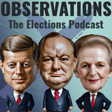
Fictional Elections: A Very British Coup with Chris Mullin
In this episode, host John Ault speaks with Chris Mullin, former Labour MP and author of A Very British Coup, about his 1982 novel that imagined what would happen if a radical socialist Prime Minister won a landslide—and the establishment decided to destroy him. Published when Tony Benn was in the ascendant and making the establishment nervous, Mullin created Harry Perkins: a Sheffield steel worker who wins power on promises to scrap nuclear weapons, leave NATO, and restore industries to public ownership.
The conversation explores the real-world inspirations behind the fiction—from Mountbatten's whispered coup talks against Harold Wilson to Cecil King's attempt to install a "businessman's government," and General Sir Walter Walker assembling a private army in the 1970s. Mullin reveals how American diplomats took him to lunch to discuss the "threat" of Michael Foot, how MI5 agents infiltrated CND (exactly as his novel predicted), and how the BBC continued vetting journalists in Room 101 even after being exposed.
When Channel 4 adapted the novel in 1988, Ray McAnally's brilliant portrayal made Harry Perkins briefly a cult figure—though the TV version ended with a car crash rather than Mullin's intended very British coup: no tanks in the streets, just gentlemen in clubs conspiring in Pall Mall. Mullin also discusses his sequel The Friends of Harry Perkins, his cameo as a vicar in the 2012 remake Secret State, and why today's Labour government is "no Harry Perkins"—trapped by tax pledges made to avoid falling into a Tory trap, running a country with a massive majority but only a third of the vote.
From fictional coups to real establishment conspiracies, this is the story of a novel that caught the zeitgeist and gave us a phrase that entered political vocabulary: "a very British coup."
